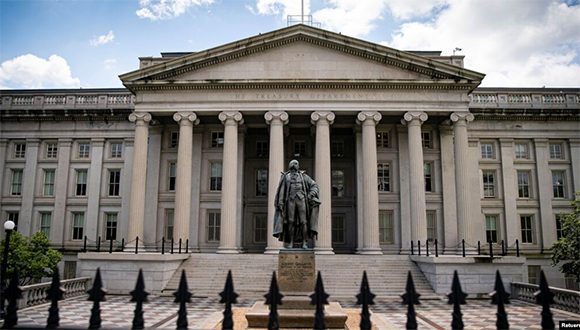U.S. Department of the Treasury. Photo: Reuters.
U.S. House of Representatives Speaker Kevin McCarthy released the bill to raise the debt limit, as Democrats and Republicans debate the tentative deal to avoid default today.
The 99-page text raises the ceiling for two years, strengthens work requirements in federal public assistance programs, and rescinds approximately $28 billion in unused COVID-19 funds.
It also caps defense spending at $886 billion for fiscal 2024, in line with Biden's defense budget request earlier this year, and $895 billion for fiscal 2025.
Veterans' health care is funded $121 billion for fiscal year 2024, while other discretionary non-defense programs get $637 billion.
It also rescinds $1.4 billion in funds that were appropriated to the Internal Revenue Service as part of the Reducing Inflation Act, which Democrats passed last summer.
The release of this bill officially starts the clock of the 72-hour rule, which gives representatives at least three days to review a bill before voting on it.
The House is expected to vote on the bill on Wednesday and then send it to the Senate for consideration.
But Democratic and Republican leaders will first have to muster enough support for the legislation to pass the legislature, a task that could become more complicated as liberals and conservatives voice their concerns.
After the pact between President Joe Biden and McCarthy was confirmed on Saturday night, congressmen from both sides of the aisle had conflicting criteria.
The disagreements came mainly from the conservative wing of the House, where representatives such as Dan Bishop, Chip Roy and Ken Buck expressed that they "did not like the agreement."
"The bottom line is that the United States will be $35 trillion in debt by January 2025. That's completely unacceptable," Buck tweeted.
Rep. Ralph Norman, a member of the conservative Freedom Caucus, wrote on Twitter that "this deal is crazy. I'm not going to vote to bankrupt our country. The American people deserve better."
For their part, some Democrats were frustrated by provisions such as strengthened work requirements for public assistance programs.
Rep. Pramila Jayapal, who chairs the Congressional Progressive Caucus, said the Democratic leadership shouldn't have the group's support just yet.
"Yes, you have to worry," Jayapal told CNN when asked if minority leader Hakeem Jeffries will be able to count on his group.
Meanwhile, conservative Senator Mike Lee is threatening to use procedural maneuvers to delay its passage.
(With information from Prensa Latina)
See also
Biden, McCarthy Approach Positions to Raise U.S. Debt Ceiling
